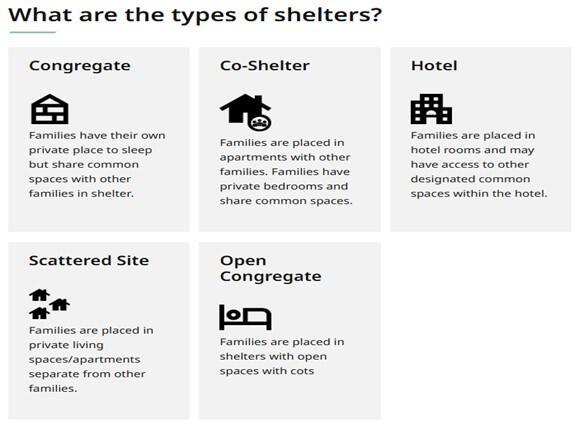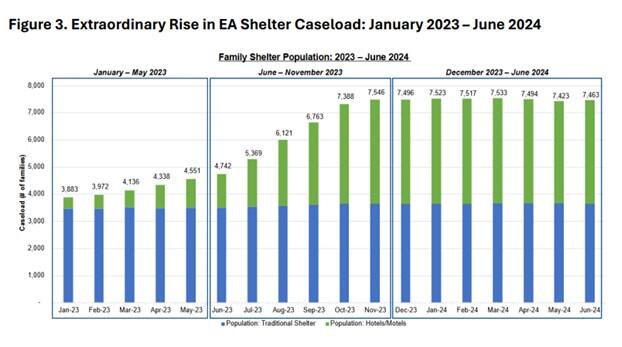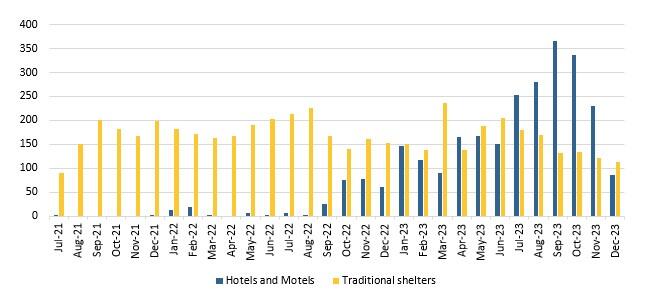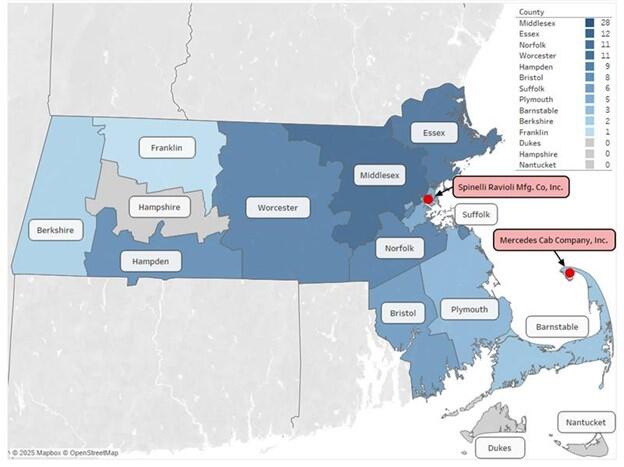Overview
The Executive Office of Housing and Livable Communities (EOHLC) was created in 2023, assuming the responsibilities of the Department of Housing and Community Development under Sections 216-219 of Chapter 7 of the Acts of 2023. EOHLC collaborates with municipalities, local housing authorities, nonprofit organizations, and development partners to provide affordable housing, financial assistance, and other essential support to Massachusetts communities.
EOHLC’s mission focuses on promoting housing production, rehabilitation, and preservation, while ensuring affordability, fairness, and equity in housing opportunities. Additionally, the agency addresses emergency and transitional housing needs, with a focus on housing stability and security.
As of June 30, 2023, EOHLC employed 430 full-time staff members. The agency received state appropriations of $584,096,312 in fiscal year 2022, $884,663,411 in fiscal year 2023, and $1,073,742,288 in fiscal year 2024.
Emergency Assistance Family Shelter and Services Program
The “Report of the Special Commission on Emergency Housing Assistance Programs,” dated November 12, 2024:
In 1983, under then Massachusetts Governor Dukakis, the Commonwealth adopted MGL Chapter 23B, Section 30 Emergency housing assistance program or what is commonly referred to as the “right to shelter law”. Massachusetts was the first and only state to adopt such a law. The goal of this law is to try to ensure that Massachusetts families with children and pregnant individuals do not experience homelessness. The state, in order to abide by this law, created a temporary emergency shelter system for homeless families with children (under 21 years of age) and pregnant individuals. This system today is known as the Emergency Assistance (EA) program and is currently administered by the Massachusetts Executive Office of Housing and Livable Communities (EOHLC).
According to EOHLC’s webpage entitled “What is Emergency Assistance (EA) Family Shelter?,” the overall goal of the Emergency Assistance (EA) Family Shelter Program is to provide temporary shelter for a family while they search for permanent housing. There are several types of temporary shelters available. (See image below.)
Source: EOHLC (https://www.mass.gov/info-details/what-is-emergency-assistance-ea-family-shelter)1
State-funded emergency shelters are available for families with children and pregnant people, provided they meet eligibility requirements. A single man without any children would not qualify for an emergency shelter. When traditional shelter units2 are unavailable, the program uses overflow hotel and motel rooms as a temporary solution until families can be linked to long-term housing options. However, several important factors must be taken into account, including family size, the number and types of beds available (such as cribs, twin beds, toddler beds, bunks, etc.), the number of floors, and the accessibility features of the unit, including stair or elevator access and compliance with wheelchair and other Americans with Disabilities Act requirements.
EOHLC’s 2025 “A Home for Everyone: Massachusetts' Statewide Housing Plan” also highlights several other factors that are more than likely contributing to families entering the EA Family Shelter Program:
- Lack of rental family housing due to families being outbid for 3+ bedroom units by individuals who need to “form larger roommate households” to be able to afford housing.
- Housing prices and rents in Massachusetts are rising faster than wages- especially for low to moderate wage earners.
- The growth of the short-term rental market has taken what was once long-term rental housing off the market.
- The state’s public housing stock has not increased and in some cases has decreased due to units being taken off-line due to the need for substantial upgrades/repairs.
The following table is from the “Report of the Special Commission on Emergency Housing Assistance Programs,” dated November 12, 2024. It demonstrates the rise in EA shelter caseloads from January 2023 through June 2024.
Source: EOHLC (https://www.mass.gov/doc/report-of-the-special-commission-on-emergency-housing-assistance-programs-draft-111224/)
During the audit period, a total of 17,848 families applied for an EA shelter. Out of these, 7,708 families were successfully placed3 in housing, which included traditional shelters, hotels, and motels. (See graph below.) Among those placed, 5,030 families were placed in traditional shelters, while 2,678 families were accommodated in hotels and motels. Additionally, there were 48 contracted providers engaged in offering shelter-based housing services within traditional units.
Families Entering Traditional Shelters, Hotels, and Motels—
July 1, 2021 through December 31, 2023
Families Entering Traditional Shelters, Hotels, and Motels—
July 1, 2021 through December 31, 2023
| Month | Families Entering Traditional Shelters | Families Entering Hotels and Motels | |
|---|---|---|---|
| July 2021 | 89 | 1 | |
| August 2021 | 150 | 0 | |
| September 2021 | 200 | 0 | |
| October 2021 | 183 | 0 | |
| November 2021 | 167 | 0 | |
| December 2021 | 198 | 2 | |
| January 2022 | 182 | 12 | |
| February 2022 | 172 | 19 | |
| March 2022 | 164 | 3 | |
| April 2022 | 167 | 0 | |
| May 2022 | 190 | 6 | |
| June 2022 | 202 | 3 | |
| July 2022 | 213 | 6 | |
| August 2022 | 226 | 1 | |
| September 2022 | 168 | 25 | |
| October 2022 | 140 | 75 | |
| November 2022 | 162 | 77 | |
| December 2022 | 153 | 60 | |
| January 2023 | 151 | 147 | |
| February 2023 | 138 | 117 | |
| March 2023 | 237 | 90 | |
| April 2023 | 139 | 165 | |
| May 2023 | 189 | 167 | |
| June 2023 | 204 | 150 | |
| July 2023 | 179 | 253 | |
| August 2023 | 169 | 280 | |
| September 2023 | 132 | 366 | |
| October 2023 | 133 | 336 | |
| November 2023 | 121 | 231 | |
| December 2023 | 112 | 86 | |
| Totals | 5030 | 2678 | |
| GRAND TOTAL | 7708 | ||
In fiscal years 2022, 2023, and 2024, the EA Family Shelter Program received state appropriations of $196,960,750, $219,441,057, and $325,251,902, respectively.
Applying for Emergency Assistance
Individuals can apply for emergency assistance by contacting a call center or in person at one of EOHLC’s regional office locations. A homeless coordinator guides applicants through the process, assesses their eligibility, and determines their safety. If a family is fleeing domestic violence, shelter can be provided immediately. Program eligibility includes residency in Massachusetts, relationship with any child/children in the family,4 pregnancy (if applicable), income5 below 115% of the federal poverty level,6 and assets7 not exceeding $5,000. Eligible families can choose between a shelter placement or can enter a diversion program to receive EOHLC assistance to find stable housing. This diversion occurs as part of the HomeBASE program, which provides short-term financial assistance for security deposits, rent, and basic furniture.
Additionally, EOHLC established two Family Welcome Centers in the Boston area. These centers serve as a resource for families, allowing them to discuss their needs and access support services. The centers assist families in applying for food and cash benefits through the Department of Transitional Assistance. Additionally, the centers provide essential supplies, such as diapers, hygiene products, and baby formula. Furthermore, the centers connect families with other community resources, ensuring that they receive comprehensive support for their well-being.
Types of Shelters
The EA Family Shelter Program offers various types of shelter accommodations to support families in need:
- Congregate Shelter: This is a shelter where multiple families share common living areas within a single building, promoting a sense of community.
- Co-Shelter: This is a shelter where two unrelated families share common spaces within an apartment, fostering mutual support.
- Scattered Site Shelter: This is a shelter where a single-family occupies a private apartment, ensuring privacy and stability.
- Hotel Shelter: This is a shelter where families are accommodated in hotel or motel rooms, with services tailored to the number of family members being sheltered. (See the heat map below for the specific number of hotels used as emergency assistance shelters during the audit period.)
This diverse array of shelter options ensures that families have access to safe and supportive living environments that are tailored to their specific needs.
EOHLC recommends a staffing ratio of one case manager for every 30 families and one housing search staff member for every 15 families. Shelters must have 24/7 on-site staffing for congregate sites and hotel sites housing 50 or more families. All families are assigned a case manager and housing search staff member, with 24/7 emergency contact available for all families.
Hotels and Motels Used as Emergency Shelters by County
Procurement Process
The normal procurement process for the Commonwealth of Massachusetts is governed by Chapter 30B of the Massachusetts General Laws, known as the Uniform Procurement Act, which establishes procedures for acquiring goods and services, ensuring open and fair competition for contracts paid for with public funds. The timelines for procurement can vary depending on the complexity and scope of the goods and services being acquired.
The normal procurement process generally involves the following steps:
- Need Identification: identifying the needs for goods and services;
- Pre-Solicitation: gathering information about potential suppliers and assessing market conditions;
- Solicitation Preparation: developing the solicitation documents, including the request for proposals or request for bids;
- Solicitation Process: publicly announcing the procurement opportunity and distributing the solicitation documents;
- Evaluation Process: evaluating the proposals or bids received from potential suppliers;
- Award Process: selecting the winning supplier and awarding the contract; and
- Contract Process: negotiating and finalizing the contract terms and conditions.
Executive departments are required to use Statewide Contracts, if available, for their commodities and service needs, and these commodities and services must be purchased through COMMBUYS.
No-bid Emergency Procurement Process
An emergency under procurement law is most often related to an immediate-term need designed to protect property or health and safety, such as a tree falling through the roof of a building during rainstorm, where the roof needs to be closed to prevent damage to the contents of the building. Emergency procurements are typically used when an emergency occurs and last only until the government agency can conduct a normal procurement to replace the emergency procurement. In the example of the tree falling through the roof, an emergency contract would allow the roof to be closed, but the repair to the roof would be required to be conducted using normal procurement methods.
Section 21.05(3) of Title 801 of the Code of Massachusetts Regulations (CMR) recognizes that unforeseen circumstances may require departments to procure goods or services on an emergency basis. Some reasons for emergency procurements include:
- the avoidance of imminent harm to the government;
- the provision of immediate mandated services;
- the provision of goods or services for people’s health, welfare, or safety; and
- the prevention of further property damage from extreme weather, fire, or acts of God.
Procurement File
As stated below, 801 CMR 21.06(1) requires procuring departments to keep records to support its decision for the selection of a vendor. These records should be maintained in a procurement file as follows:
A Procuring Department shall maintain a paper or electronic procurement file for each Procurement of Commodities or Services, or both. The file shall contain the original, copies or the file location of the RFR and data or other information relevant to the Procurement and selection of a Contractor, the executed Contract form(s), correspondence with the Contractor and any applicable approvals or justifications.
The Office of Inspector General’s The Chapter 30B Manual: Procuring Supplies, Services and Real Property states the following:
If the time required to comply fully with Chapter 30B would endanger the health or safety of people or their property due to an unforeseen emergency, you may procure the needed item or service without complying with all of Chapter 30B’s requirements. Even under emergency circumstances, however, you must comply with Chapter 30B to the extent possible. For example, if you do not have time to advertise for two weeks, you can shorten the advertising period; or, if you have no time to advertise, you can solicit quotes. You may procure only those supplies or services necessary to meet the emergency.
You must maintain a record of each emergency procurement, documenting the basis for determining that an emergency exists, the name of the vendor, the amount and type of contract, and a list of the supplies or services purchased under each contract. We recommend that you also include in your record all procedures followed to elicit competition. Your record of an emergency procurement must be submitted as soon as possible to the Goods and Services Bulletin for publication.
Emergency Contracts
During the audit period, EOHLC initiated several no-bid emergency contracts to quickly provide shelter and essential services to families experiencing homelessness. There were four emergency contracts: one for food services, one for transportation services, and two that provided temporary shelter placement.
Two of the funded no-bid emergency contracts with Ascentria Community Services Inc. and United Way of Massachusetts Bay provided the following services:
- Temporary Shelter: immediate placement in shelter housing;
- Case Management: case managers assistance to families to overcome barriers to finding housing, while securing connections to healthcare and job placement services;
- Housing Search and Placement: assistance in securing permanent housing;
- Crisis Intervention: addressing immediate needs like food and healthcare;
- Family Stabilization: services such as counseling and treatment for underlying issues contributing to homelessness;
- Financial Assistance: financial aid for housing costs and utilities; and
- Referrals: connection to other essential services, including legal and workforce programs.
EOHLC’s use of emergency contracts grew in response to rising shelter demand, driven by a competitive housing market and an influx of migrant families. In response to these challenges, Governor Maura Healey, in a letter to the Secretary of Homeland Security,8 proclaimed a state of emergency on August 8, 2023. The Secretary of EOHLC imposed a 7,500-unit limit on the EA shelter system on October 31, 2023 to manage the crisis.
The food service contract was awarded to Spinelli Ravioli MFG CO, Inc., referred to in this report as Spinelli, to prepare and deliver meals to families residing in 30 hotels and motels used as temporary emergency shelters.9 Throughout the duration of the contract, which ended in March 2024, a total of 5,142 deliveries were made from the location shown on the map on page 12, providing 487,899 meals. (See table below.)
Spinelli Meal and Delivery Breakdown
| Type of Meal Provided | Rate per Meal | Total Meals Provided | Total Cost |
|---|---|---|---|
| Breakfast | $14.35 | 89,260 | $ 1,280,881 |
| Lunch | $17.81 | 186,259 | 3,317,272 |
| Boxed Lunches | $18.71 | 315 | 5,893 |
| Dinner | $20.95 | 210,805 | 4,416,364 |
| Boxed Dinners* | $18.71 $19.75 | 1,120 140 | 20,955 2,765 |
| Total of all meals provided | 487,899 | $ 9,044,130 | |
| Deliveries | 5,142 | 402,568 | |
| Total meals and deliveries | 493,041 | $ 9,446,698 |
* Spinelli charged two different rates for Boxed Dinners.
A transportation contract was awarded to the car service, Mercedes Cab Company, located in North Truro on the tip of Cape Cod—now operating as Pilgrim Transit—to provide families staying in hotels or motels statewide with access to transportation. According to EOHLC’s Standard Operating Procedures regarding transportation services, the list of approved rides are used for the following types of services:
- an urgent medical need or doctor’s appointment;
- an appointment with a state agency or benefit center, such as the Department of Transitional Assistance or the Women, Infants, and Children Nutrition Program;
- a visit to MassHealth Enrollment Centers or organizations with a Certified Application Counselor program; or
- an appointment with immigration or legal services.
Mercedes Cab Company / Pilgrim Transit is located as displayed on the map on page 12. Throughout the Commonwealth and neighboring states, Mercedes Cab Company has completed a total of 15,924 trips, averaging 15.49 miles per trip, with an average cost of $155 per trip ($10.01 per mile) for a total cost of $4,749,308. Out-of-state travel was rendered near the Massachusetts border for services such as immigration appointments and medical care, where the nearest facilities may be outside of Massachusetts. The fee schedule for both in-state and out-of-state rides is detailed in the table below.
Mercedes Cab Company / Pilgrim Transit Fee Schedule
| Base Fee Types | Price |
|---|---|
| Load fee first-person | $140 |
| Load fee for each additional person on the same request | $40 |
| Miles included in load fee | - |
| Charge per mile for additional mileage | $6.75 |
| Wait time per half-hour segment | $90 |
| Included wait time at pickup (minutes) | 5 |
| Cancel at door / no-show fee | $150 |
| All other cancelation fees | $120 |
| Wheelchair Van | |
| Load fee first-person | $498 |
| Load fee for each additional person on the same request | $40 |
| Miles included in load fee | - |
| Charge per mile for additional mileage | $8.00 |
| Wait time per half-hour segment | $120 |
| Included wait time at pickup (minutes) | 5 |
| Cancel at door / no-show fee | $350 |
| All other cancelation fees | $200 |
In comparison, the Boston Police Department’s website includes the following taxi rates:
Meter Rates
- Per Mile and Tolls: First 1/7 Mile: $2.60. Each 1/7 Mile thereafter .40. Tolls Additional
- Idling/Waiting Time: $28.00 Per Hour
- Passenger pays $2.75 toll for all trips from Boston proper to Logan Airport and North Shore Communities.
- Passenger pays no toll from Boston proper to East Boston, not including Logan Airport.
We acknowledge that taxi meter rates are likely to differ from city to city. However, these rates are drastically lower than the rates charged by Mercedes Cab Company / Pilgrim Transit. For example, Mercedes Cab Company / Pilgrim Transit charged $90 for 30 minutes of wait time / idling, or $180 for 60 minutes of wait time / idling. According to the Boston Police Department, the metered taxi rates charge only $28 per hour of wait time / idling. The charges for wait time / idling billed by Mercedes Cab Company / Pilgrim Transit are over five times higher than the wait time / idling the metered taxis would have charged. A one-mile taxi ride in Boston would cost $5.00 (not including wait time / idling), while a one-mile Mercedes Cab Company / Pilgrim Transit ride cost $146.75 (not including wait time / idling). Each mile of transit via taxi in Boston would cost $2.40 after the first one-seventh of a mile compared to $6.75 per mile for Mercedes Cab Company / Pilgrim Transit.
Ascentria Community Services was awarded one of the emergency housing contracts. This contract allowed EOHLC to provide essential supportive services to families in the shelters. Ascentria is a community service organization based in Worcester that has experience in providing specialized support and services to stabilize families at risk of homelessness or those who are already experiencing homelessness. The organization serves Massachusetts and New Hampshire with a range of community-based programs. It provides services to families, children, and teens who are at risk, as well as individuals with developmental disabilities and mental illness. Additionally, Ascentria supports refugees and immigrants from around the world, including unaccompanied refugee minors, and offers assistance to older adults.
EOHLC also awarded an emergency contract to the United Way of Massachusetts Bay. In response, the United Way initiated a grant program designed to support community-based organizations that established and operated safety net shelters for extremely low-income families with children and pregnant individuals who lacked other safe sleeping arrangements and would otherwise be forced to sleep in places not meant for human habitation. The United Way of Massachusetts Bay selected community-based organizations to receive grant funding to operate these safety net shelters and provided technical guidance and resource navigation to them as needed.
| Date published: | May 20, 2025 |
|---|



